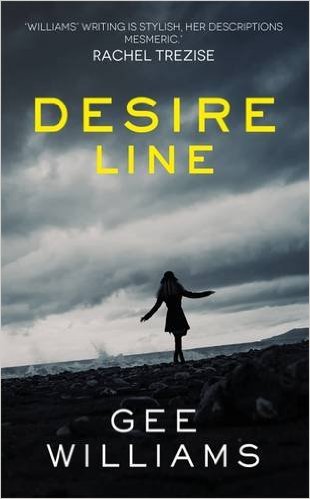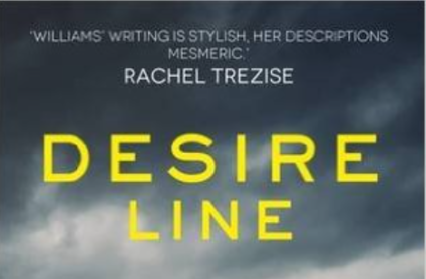Emma Schofield reviews Desire Line, the second novel by poet, dramatist and prize-winning short story writer Gee Williams.
At first glance you could be forgiven for thinking that poet, dramatist and prize-winning short story writer Gee Williams’ second novel, Desire Line, is primarily a mystery, set against the backdrop of a sleepy Welsh seaside town, based loosely on Rhyl. The novel opens in the aftermath of a freak tidal surge which has flooded the town and left four people dead in its wake. Three of the bodies are identified as local residents, caught in the force of the wave, but the third belongs to an outsider to the town, renowned writer Sara Meredith. As the story unfolds the plot centres on the weeks leading up to Sara’s death and the reasons why she came to be in the town at the time of the tidal surge.

Yet Gee Williams’ novel is, at its core, a tale of human experience and loss, and of the secrets that exist within the most ordinary of relationships. As the background to Sara’s untimely demise is slowly pieced together her troubled relationships with her estranged husband Josh and her fifteen year old daughter, Eurwen, are brought to light in a bid to trace Sara’s final movements. It is in this respect that Williams’ writing shines; her depiction of characters who move from the pages to become entirely believable people is one of the strengths of the novel. This skill is particularly noticeable in Williams’ depiction of Sara as a concerned parent trying to trace the whereabouts of her runaway daughter, while quietly battling her own demons in the form of a dependence on alcohol and the breakdown of her marriage. Here, Williams’ characters illustrate the ebb and flow of the relationship of a separated couple attempting to respond together to the disappearance of their daughter.
What stands out about the scene Gee Williams depicts in Desire Line is the way in which the figure of the ‘outsider’ is so central to the novel. From the outset a line is drawn between the residents of the town and those who have come from outside in the form of visitors or tourists. The assertion that ‘a Wave hates everything, even its own’ seems to mark the degree of separation which exists between the three local residents drowned in the surge and Sara, who, as a visitor from Oxford, has no clear place within the town. Similarly, the introduction of a stranger called Yori, a young half-Japanese man with whom both Sara and Eurwen’s lives have become entangled, furthers the image of a place in which there are those who are seen to belong and those who are not. In this respect, there is merit in the way Gee Williams evokes the image of a stifling seaside town marred by its fear of change and mistrust of outsiders. As it winds towards its conclusion, Desire Line becomes a story of personal redemption and recovery, with human struggles mirrored by the town’s fight to maintain its identity in the face of essential regeneration and renewal.
These skilful depictions are testament to Gee Williams’ imagination and her ability to translate such thoughts through her writing. Yet at over four hundred pages this is a weighty novel and there are places where the pace feels slightly unnatural. Chapter breaks occasionally seem forced and the dialogue in the first half of the novel is sometimes hindered by brief exchanges which, in some instances, lack clarity as to who is speaking or being discussed. In these moments, the complexity of the plot jars with a lack of fluidity in the narrative, which may momentarily halt readers’ progression through the text. Persevere with these early hiccups, however, and this is a novel which ultimately rewards its readers with a dramatic and unexpected conclusion.
While the narrative occasionally lacks the succinct tone of Williams’ short stories, there is, nonetheless, much to be applauded in Desire Line. The powerful depiction of a mother searching for her missing daughter, juxtaposed against Yori’s quest to uncover his family’s identity and history, makes this a compelling read. Mapping a complex sequence of events, alongside an exploration of the effects of trauma and loss, embodied by the tidal surge which strikes the North Wales’ coastal town, Desire Line is a thought-provoking observation of human behaviour that will draw readers in to its mysterious, and often dark, world.
Emma Schofield is a Wales Arts Review Senior Editor.











